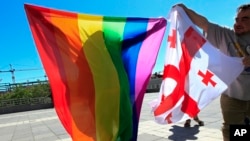Organizers of Tbilisi Pride in the Southern Caucasus nation of Georgia say government officials have abandoned their duty to protect citizens in the face of violent threats, but that they are moving forward with scheduled events anyway.
"We had only one demand from the government: to ensure safety and protection for everyone who would be going out, and to have access to our constitutional right of freedom of assembly," Giorgi Tabagari, a prominent gay rights activist, told VOA's Georgian Service.
The Georgian capital has been edge in days leading up to its inaugural Pride celebrations, which are scheduled to culminate in the March of Dignity through city center Saturday, the first event of its kind since a gathering against homophobia in 2013 saw dozens of demonstrators attacked by Orthodox Christian priests and ultra-conservatives armed with clubs and other weapons.
Having long urged government officials to provide security at planned events, Tbilisi Pride organizers rallied outside Georgia's Ministry of Internal Affairs over the weekend, chanting, "State, where are you?"
Pro, anti groups
That event drew an anti-gay group led by Levan Vasadze, a Georgian Orthodox Church-linked businessman who made millions in Moscow and has close ties with Russia neo-Nazi philosopher Alexander Dugin.
Hours of shouting and threats ensued as a line of police cordoned the groups before dispersing them.
Vasadze's subsequent calls to enlist politically sympathetic citizens in an anti-Pride militia drew threats of legal action by the interior ministry, whose officials later joined with the country's ombudswoman to meet separately with Pride organizers to ask that the events be canceled.
"Our goal was to raise the concerns that the LGBT community is facing ... and use the March of Dignity to promote these issues and discuss it," Tabagari told VOA, explaining that organizers, despite some infighting, plan to proceed with the events in defiance of threats and protest.
In statement issued Tuesday, Pride organizers called on Georgians to attend to fight for the country's democratic future.
Georgian President Salome Zourabichvili Tweeted last week: "I am everyone's president, regardless of #sexualorientation or religious affiliation. No human should be discriminated against. I must also emphasize that our country is dealing with enough controversies and doesn't need any further provocation from any side of the [LGBT] debate."
Tabagari said Pride events are aimed to create a constructive dialogue about gay rights, which remains a controversial topic in the mostly Orthodox post-Soviet republic, where conservatives pride themselves on protecting traditional values.
"Lot of these people are manipulated by their leaders and pro-Russia individuals who have their political agenda, and unfortunately they buy this narrative of hatred from this group," he said.
"The main idea is that we might dislike each other, we might not agree with the other groups, but the idea of the constitution and the idea of freedom is that we need to coexist in society without being aggressive and hateful to each other," he added. "We need to able to protest and counterprotest without getting into a clash and trigger a civil war. It's as simple as that."
'Essence of democracy'
Public displays of LGBT pride are "the essence of democracy and, unfortunately, I feel that this is not the case at the moment in this country," Tabagari said. "Unfortunately, the government is not helping to create circumstances for this, and this is how hatred breeds instability and destroys the social fabric; it undermines democratic values and human rights and everything that a fully fleshed democratic country should be standing for."
Responding to the allegations, Georgian Prime Minister Mamuka Bakhtadze called the entire issue "artificially forced on Georgian society, serving only an aggressive agenda in the country."
"In Georgia, the right of every citizen is protected and guaranteed by the constitutional law, among them freedom of expression," he said.
"However, we also have a responsibility to guarantee every citizen's safety," which, he explained, justifies his support for government calls to outright cancel the Pride events.
Patriarch Ilia II, head of the Georgian Orthodox Church, has called upon the government to not allow for the march, calling it "unacceptable."
On Wednesday, however, the patriarch's office issued a statement saying that it distances itself from aggressive statements coming from certain members of the church as well as other anti-gay groups.
US reaction
On Monday, the U.S. State Department issued a statement of "deep concern about reported threats targeting the LGBTI community in advance of the Tbilisi Pride parade."
"We categorically condemn the persecution of individuals for any reason, including their sexual orientation or gender identity," a spokesperson said. "We welcome the Georgian government's statement that it will ensure the right of assembly and freedom of expression for each citizen. The United States will continue to urge Georgian authorities to protect all citizens regardless of sexual orientation or gender identity."
In May 2012, a peaceful march in central Tbilisi marking the International Day Against Homophobia and Transphobia and Biphobia came under attack when a group of Orthodox Christians began insulting and threatening LGBT activists.
Amnesty International says neither the 2012 nor the 2013 attacks were adequately investigated.
In addition to Dignity March, also scheduled for June 22, Pride organizers are planning to host a conference and stage a theatrical performance.
Amnesty International has announced plans to send an international monitoring team to Tbilisi and said, "Georgian officials have a positive obligation to take all necessary measures to protect the Tbilisi Pride march from attacks."
On Thursday, the Council of Europe's commissioner for human rights called on Georgian officials to safeguard Pride events, calling respect for the human rights of all citizens, "regardless of any differences, the cornerstone of a democratic society."
This story originated in VOA's Georgian Service.




